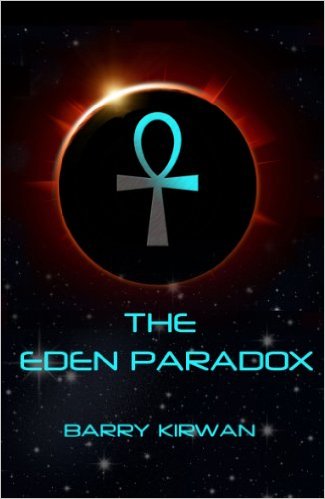
Firstly I would like to thank Barry and Neverland Blog tours for allowing me to take part in this blog tour
Synopsis
A murder… a new planet mankind desperately needs… a thousand-year old conspiracy… What really awaits us on Eden? In a world beset by political turmoil, environmental collapse, and a predatory new religion, a recently discovered planet, Eden, is our last hope. But two missions have failed to return. Blake Alexander and his crew lead the final attempt to bring back good news. Meanwhile back on Earth, Micah Sanderson evades assassins, and tries to work out who he can trust as he struggles in a race against time to unravel the Eden Paradox.
Today I would like to welcome Barry Kirwan onto my blog. I absolutely love with a capital L Barry’s Nadia Laksheva series of books, written under Barry’s pen name J F Kirwan.
Click here to buy The Eden Paradox
Click here to view on Goodreads
Today Barry hosting guest post about love and science fiction…

Why isn’t there more love in science fiction?
Guest blog by Barry Kirwan
It’s hard to think of a science fiction book or film where love is the central premise; it usually plays second fiddle at best. Readers of SciFi are looking for spaceships, aliens, new worlds, and cunning plots. Think of Star Wars, probably the best-known Scifi film – Luke initially is drawn to Princess Leia, but it doesn’t work out, and in fact she turns out to be his sister. In any case she is more interested (what girl wouldn’t be?) in Han Solo. But such threads are secondary to the vast sweep of The Empire, Darth Vader, the Force, Obe Wan Kenobe, light-sabre fights and the Death Star.
In books it’s similar. Scifi classics such as Asimov’s Foundation, Herbert’s Dune, or Clarke’s Rama series, don’t have love as a central premise – it’s not what we remember about these works, although Dan Simmons’ Hyperion has one of its pilgrims’ stories recounting a love story that is one of the most powerful I’ve ever read. Alistair Reynolds’ Revelation Space is also a rare, exceptional mixture of galaxy-spanning space opera and ‘love at any cost’. But generally, from Larry Niven’s Ringworld to Iain Banks’ culture novels, love is in the background. If readers want to read romance novels, these are available by the bucket-full in mainstream or romance fiction. Occasional cross-overs (the Time-travellers’ wife) may look like science fiction, but for most Scifi fans they belong more in the romance genre.
Of course, Scifi writers might just be geeks who don’t get much ‘luvvin’, and well, as the saying goes, you ‘write what you know’, the implication being that the converse also holds. Well, I’d have to disagree (what scifi writer wouldn’t?), and there are some notable ‘proofs’, such as Orson Scott Card who writes great Scifi (Ender’s Game, etc.), and also writes romance [thanks Orson, for shielding our collective reputation!]. Iain Banks is another eminent Scifi author who writes in other genres. I also remember, when producing my first Scifi book, having professional editors asking me to tone down the ‘love’ angle, as it didn’t fit the genre, and downright remove some of the more exotic sex scenes: simply not done, old chap!
Of course when it comes to aliens, they might not love at all. Geneticists would tell us that love is all about procreation, and in fact is a myth we’ve woven onto a biological need to further the species. This possible truth is easier seen when mapped onto fictional alien species, especially when the method of procreation can be rendered less human (e.g. insectoid species laying eggs). But good Scifi writers don’t throw the baby out with the bathwater, and for example I always found a strong part of the film Alien to be that the alien in question was fiercely protective of her offspring, which makes sense for any species, and we don’t have to call it ‘love’.
What does annoy me, however, is ‘love colonialism’ [Star Trek is guilty of this over and over] wherein humans convince non-loving aliens that they are really missing out, and that love is some universal truth. It might be, but let’s not get carried away with ourselves; bacteria do pretty well in terms of survival without it, and they’ve been around a lot longer.
In my Eden series, aliens don’t normally exhibit strong love tendencies, though they ‘care’ in particular for their own, although in my third book I do have a very advanced species (called the Kalarash) who seem to have some depressingly familiar love issues: e.g. a couple of them have not been talking to each other for half a million years after a tiff. Beneath this seemingly flippant situation is a deeper hypothesis – that love might be a product of civilisation. Very advanced cultures might eschew love and go beyond it (as in Stargate’s idea of ‘ascension’), or else it might be the ultimate goal.
I have to confess that in my second book (Eden’s Trial), I have a couple of drones (artificial intelligences) fall in love (they experience ‘perfect electronic resonance’), though it is brief, and in keeping with Scifi tradition, it doesn’t end well… More seriously I’m exploring the effects of genetically-engineered advancement on the ability to love, in the Eden series, most strongly portrayed in between the characters Kat and Pierre, and the genetically modified children who grow up to become the Genners – advanced in every other way except one – they are emotionally retarded.
Which brings me to the last point, that (regrettably?) there is no scientific basis for love. Love may simply be an inferred (learned) experience that we map onto natural hormonal responses: we feel something (endorphins), and we learn to call it love. Certainly as any of us who experienced teenage love and then fell out of it, it feels like drug withdrawal, doesn’t it? Endorphins are a natural drug we have in our heads.
Of course, science, and science fiction have to accept the possibility of the alternative hypothesis – that love is real (phenomenologically speaking, this is ‘true’), but science is too dumb (yet) to be able to measure it. I hinted at this, and the importance of love for an alien species, in my short story ‘The Sylvian Gambit’, which is essentially a Scifi love story, wherein the protagonist says near the end: “Love: wrap an equation around that.”
The deeper question is not whether scifi writers include love between their covers, as many people will say ‘who cares?’ Yet science fiction is a projection of our future. What if there is no love in our future? Could we evolve and advance in other ways, yet lose the ability to love? That is what I have tried to answer in the Eden series. And to cut a long series short, the answer is that we will hang onto it, because at the end of the day, it not only defines us, but gives us a strong will to survive collectively, because we want to protect those we love.
All about Barry

Barry (J F) Kirwan is a split personality. He writes science fiction under the name Barry Kirwan, and thrillers under his pen name J F Kirwan. In his day job, he travels worldwide, working on aviation safety. He lives in Paris, where he first joined a fiction class – and became hooked! This led to an acclaimed four-book series called the Eden Paradox. But when a back injury stopped him scuba diving for two years, he wrote a thriller about a young Russian woman, Nadia, where a lot of the action occurred in dangerously deep waters.Two of these thrillers are now out and he’s working on the third, as well as a new science fiction novel called ‘When the children come.’
Where to find Barry

To win a a £20 or $25 Amazon giftcard click here
